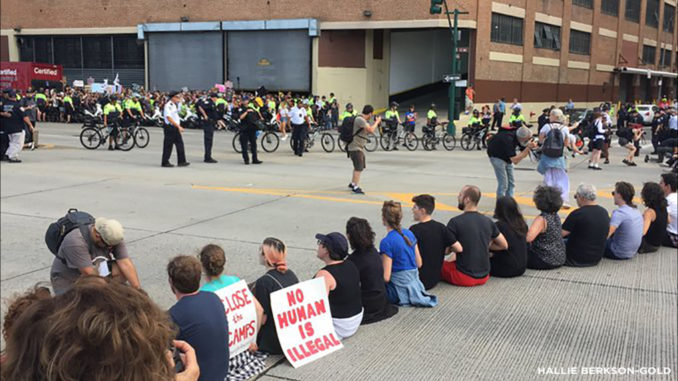
By Daniel B
Direct action necessarily means coming into conflict with entrenched power structures, usually personified by the police or other guardians of private property. Not all of us who organize will put our bodies on the line in this way, risking injury or arrest for the sake of an action, but for those who have the ability to do so, it can be a powerful way to forward our efforts in this shared struggle. In this piece, one comrade offers his experiences being arrested in connection with the West Side Highway shutdown/Close the Camps effort. Here are Daniel’s own words about his experience and resulting arrest:
August 10th was my first time being arrested, and I didn’t really know what to expect. The organizers did everything they could to prepare us — and I knew that because of my identity, I would have it a lot easier than most people who deal with the NYPD — but I was still nervous to step out onto the West Side Highway and block traffic. When the time came and I was face to face with a line of honking cars, I got stage fright and could barely chant or sing. I’ve always had this kind of anxiety at protests, but I’m stubborn and I knew I could keep standing there, holding hands, even if I couldn’t say a word. What kept me committed was knowing I was not alone, and that there would be people waiting for me to get out with caring words and snacks.
After being arrested, I spent about 8 hours in a jail cell with 40 comrades (everyone the NYPD considered male was put in a cell together). Talking about politics and our lives helped the time pass quickly and kept my spirits up.
Before that Saturday, I wasn’t sure I knew why I was participating in the action. I have been involved in the Immigrant Justice Working Group for about two years, but I still wondered: what could blocking traffic for a little while really do to help the ongoing, worsening immigration crisis? If this action wouldn’t have any immediate impact, what made it different from a march, attending a meeting, or even sitting at home feeling angry? Not everyone who was arrested with me called themselves a socialist like I do. If we didn’t agree on a political vision, what could we accomplish?
But looking back, I can see it clearly: together, we were flexing a social muscle, exercising a collective right. The more people who sit down in the middle of highways, who chain themselves to ICE office doors and generally act up, the more people will join in. Refusing to move along demonstrates that as inevitable as horrible things can feel, society relies on all of us obeying. Withdrawing our consent shows our power. Most of us had never been arrested before this action; now we can share what we’ve learned and next time, the action will be bigger.
Our action brought attention from the public, and builds momentum against the deportation machine. We overcame our reluctance, the voices in our heads saying to follow the rules, and the movement is a little stronger for it. This time we stopped traffic for an hour, and next time we’ll stop more. Until one day, when we’ll stop it all.
